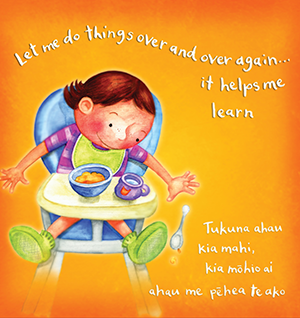
Baby is learning about cause and effect
Very young babies’ actions are unintentional, but it’s not long before they realise that they can make interesting things happen when they do things. Over time, they begin to learn the connection between actions and results.
Cause and effect for babies is when they understand and experiment with making things happen – what happens when I drop my spoon off the high chair? This is an important stage of cognitive development.
Experimenting
Babies are naturally curious and want to keep experimenting. They’ll move from one curious experiment to another as their interests change.
A cause and effect experiment might look like this – after pēpi has ‘caused’ the spoon to drop, they make some sort of a noise to alert mum. The ‘effect’ is that she picks the spoon up and puts it back on the tray, to which pēpi responds by dropping it over the side again. This experimentation could go on all day.
There are lots of things they’ll be doing that they’re learning from:
- noticing what happens when they drop, throw, shake or bang objects
- looking for things that seem to have disappeared from sight
- looking around, trying to find the source of sounds they hear
- learning that when they wave, someone else will wave back and maybe say ka kite or bye-bye
- learning that if they splash water at bath time, everyone might get wet.
All of this is cause and effect.
Babies love to shake, rattle, drop, bang and throw things to find out what they can do. They learn to push a button to make something happen, and become fascinated by putting things into and taking things out of containers. This may progress to posting shapes into a sorter, and other activities that grow their problem-solving skills.
Babies don’t need expensive toys to practice their understanding of cause and effect. There are plenty of safe toys in the kitchen cupboards that they can experiment with – spoons, saucepans, bowls and cups.
Try an activity
In and out of containers
Whānau and pēpi explore moving objects into and out of containers. Add parallel talk to build language understanding.
Repetition helps with learning
Babies repeat actions over and over again to see what happens each time. They are learning from repeating these actions. This is a very normal and healthy stage of development.
As baby repeats an action, the connections in the brain become stronger and baby can do the action more efficiently. The connections get covered in myelin too – a fatty coating that wraps around the axons of the brain cells and helps messages travel quickly and efficiently.
Babies are like little scientists learning from their experiments. They’ll move from one curious experiment to another as their interests change. Thinking about the learning that’s happening for baby through all their repeated experimenting can help parents see that wiping up the bathroom floor (again) is the result of having a scientist in the whānau, rather than being purely a household chore.
Conversation ideas
Helpful resources for whānau
-
Growing great brains<
Growing great brainsJason Tiatia from the Brainwave Trust shares some tips on helping pēpi grow great brains.












